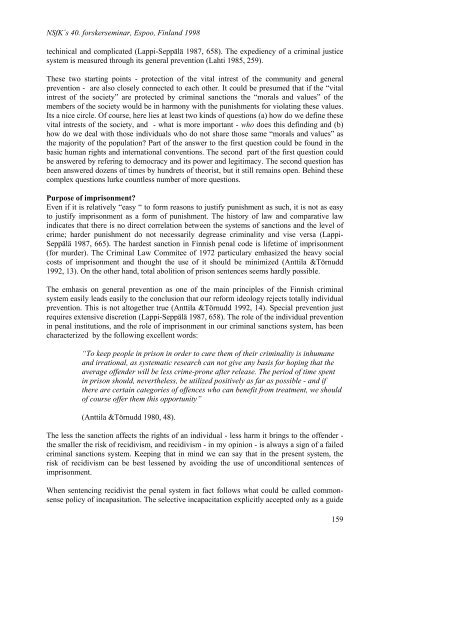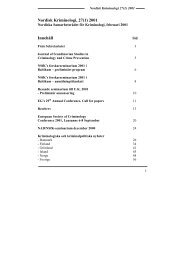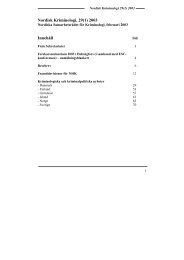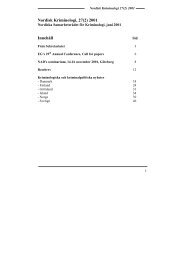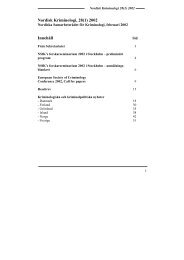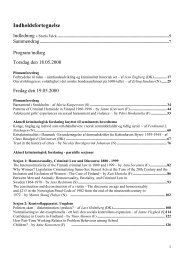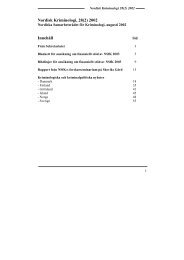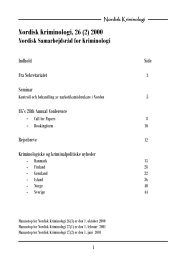Organised Crime & Crime Prevention - what works? - Scandinavian ...
Organised Crime & Crime Prevention - what works? - Scandinavian ...
Organised Crime & Crime Prevention - what works? - Scandinavian ...
You also want an ePaper? Increase the reach of your titles
YUMPU automatically turns print PDFs into web optimized ePapers that Google loves.
NSfK´s 40. forskerseminar, Espoo, Finland 1998<br />
techinical and complicated (Lappi-Seppälä 1987, 658). The expediency of a criminal justice<br />
system is measured through its general prevention (Lahti 1985, 259).<br />
These two starting points - protection of the vital intrest of the community and general<br />
prevention - are also closely connected to each other. It could be presumed that if the “vital<br />
intrest of the society” are protected by criminal sanctions the “morals and values” of the<br />
members of the society would be in harmony with the punishments for violating these values.<br />
Its a nice circle. Of course, here lies at least two kinds of questions (a) how do we define these<br />
vital intrests of the society, and - <strong>what</strong> is more important - who does this definding and (b)<br />
how do we deal with those individuals who do not share those same “morals and values” as<br />
the majority of the population? Part of the answer to the first question could be found in the<br />
basic human rights and international conventions. The second part of the first question could<br />
be answered by refering to democracy and its power and legitimacy. The second question has<br />
been answered dozens of times by hundrets of theorist, but it still remains open. Behind these<br />
complex questions lurke countless number of more questions.<br />
Purpose of imprisonment?<br />
Even if it is relatively “easy “ to form reasons to justify punishment as such, it is not as easy<br />
to justify imprisonment as a form of punishment. The history of law and comparative law<br />
indicates that there is no direct correlation between the systems of sanctions and the level of<br />
crime; harder punishment do not necessarily degrease criminality and vise versa (Lappi-<br />
Seppälä 1987, 665). The hardest sanction in Finnish penal code is lifetime of imprisonment<br />
(for murder). The Criminal Law Commitee of 1972 particulary emhasized the heavy social<br />
costs of imprisonment and thought the use of it should be minimized (Anttila &Törnudd<br />
1992, 13). On the other hand, total abolition of prison sentences seems hardly possible.<br />
The emhasis on general prevention as one of the main principles of the Finnish criminal<br />
system easily leads easily to the conclusion that our reform ideology rejects totally individual<br />
prevention. This is not altogether true (Anttila &Törnudd 1992, 14). Special prevention just<br />
requires extensive discretion (Lappi-Seppälä 1987, 658). The role of the individual prevention<br />
in penal institutions, and the role of imprisonment in our criminal sanctions system, has been<br />
characterized by the following excellent words:<br />
“To keep people in prison in order to cure them of their criminality is inhumane<br />
and irrational, as systematic research can not give any basis for hoping that the<br />
average offender will be less crime-prone after release. The period of time spent<br />
in prison should, nevertheless, be utilized positively as far as possible - and if<br />
there are certain categories of offences who can benefit from treatment, we should<br />
of course offer them this opportunity”<br />
(Anttila &Törnudd 1980, 48).<br />
The less the sanction affects the rights of an individual - less harm it brings to the offender -<br />
the smaller the risk of recidivism, and recidivism - in my opinion - is always a sign of a failed<br />
criminal sanctions system. Keeping that in mind we can say that in the present system, the<br />
risk of recidivism can be best lessened by avoiding the use of unconditional sentences of<br />
imprisonment.<br />
When sentencing recidivist the penal system in fact follows <strong>what</strong> could be called commonsense<br />
policy of incapasitation. The selective incapacitation explicitly accepted only as a guide<br />
159


